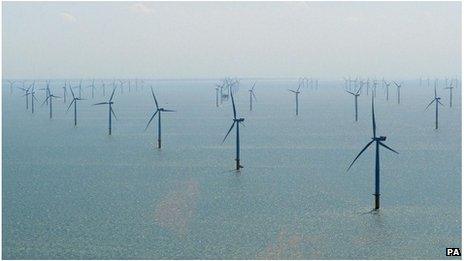Major changes for government renewable energy subsidies
- Published
- comments

Subsidies for offshore windfarms are set to rise at the expense of onshore options
The government is to make big changes to the way it subsidises renewable energy, it has announced.
Ministers say they will cut support for onshore wind and solar energy, but give more backing to offshore wind power.
Chief Secretary to the Treasury Danny Alexander described the shift in subsidy as "a rebalancing" and said overall spending would not change.
But Labour said "chopping and changing" pricing was bad for business.
The price producers are promised for onshore wind power and solar energy will be cut from 2015, while the amount paid for offshore wind power will be increased.
The shift on wind energy comes ahead of Chancellor George Osborne's Autumn Statement, which he will deliver to MPs on Thursday.
Other pre-statement announcements include:
Details of the National Infrastructure Plan (NIP), with plans for £375bn of investment in energy, transport, communications, and water projects
The NIP also entails selling off the government's 40% stake in the Eurostar rail service as part of a plan to double the target for the sale of corporate and financial assets, from £10bn to £20bn, between 2014 and 2020
It features a further £50m for a redevelopment of the railway station at Gatwick Airport and financial support for the development of a new nuclear power station at Wylfa, north Wales
There is also confirmation that a UK guarantee has now been agreed for the £1bn Northern Line extension to Battersea in London
Road projects in the NIP include improvements to the A50 around Uttoxeter, in Staffordshire, and improvements to the A14 around the port of Felixstowe in Suffolk
The BBC has learned that Mr Osborne also plans to cap business rate rises in England and Wales next year at 2% instead of having them linked to inflation
Sources from both coalition parties said there had been so much investment in onshore wind and solar energy that they no longer needed so much state support.
In contrast, they said, offshore wind sources still needed more subsidy to encourage long-term investment.
Mr Alexander denied suggestions the move was a response to Conservative MPs' unhappiness at wind farms being sited in their constituencies.
Both Conservative and Liberal Democrat sources said the decision made good political sense because they would have a policy that countered the threat from the UK Independence Party, which opposes all wind farms on principle.
Strike prices - the amount the government guarantees to pay per unit of electricity - are set substantially above the current value of energy, as a form of long-term subsidy to encourage firms to invest.
One Conservative source said he expected "quite a dramatic cut" in prices for onshore wind in 2015 and beyond. Another spoke of the "beginning of the end for mature renewables".
One source said: "We are in a very good place. If we didn't curtail onshore a bit, we would have so much onshore that the constraint wouldn't be financial but political. Ditto solar.
"So constraining solar and onshore makes good value-for-money sense, it lets us move quicker than expected to market forces, and enables us to ensure that the one renewable technology that can go to scale in the 2020s - offshore wind - gets the early support that an immature technology needs."
Energy Minister Michael Fallon said costs must be spread "much more fairly".
Downing Street denied that cuts in subsidies for onshore wind farms were in response to public concern that they were blighting the countryside.
The prime minister's official spokesman said: "The decision was based purely on the falling cost of onshore wind farms".
But, for Labour, shadow chief secretary to the Treasury Chris Leslie told BBC Radio 5 live: "They're just chopping and changing all the time - very bad for stable, long-term investment."
Gordon MacDougall, chief operating officer of renewable energy firm RES, added: "This announcement is a blow for investor confidence and will cut the deployment of onshore wind - the lowest-cost renewable energy technology in the UK's energy mix.
"By undermining onshore wind before it reaches maturity and substituting it with more expensive low-carbon energy, the cost to the consumer will increase."
* Mr Osborne will update MPs on the state of the economy from 11:15 GMT on Thursday, with live coverage and analysis of the Autumn Statement on the BBC news website, BBC TV and radio.
- Published3 December 2013
- Published26 November 2013
- Published26 November 2013
- Published26 November 2013